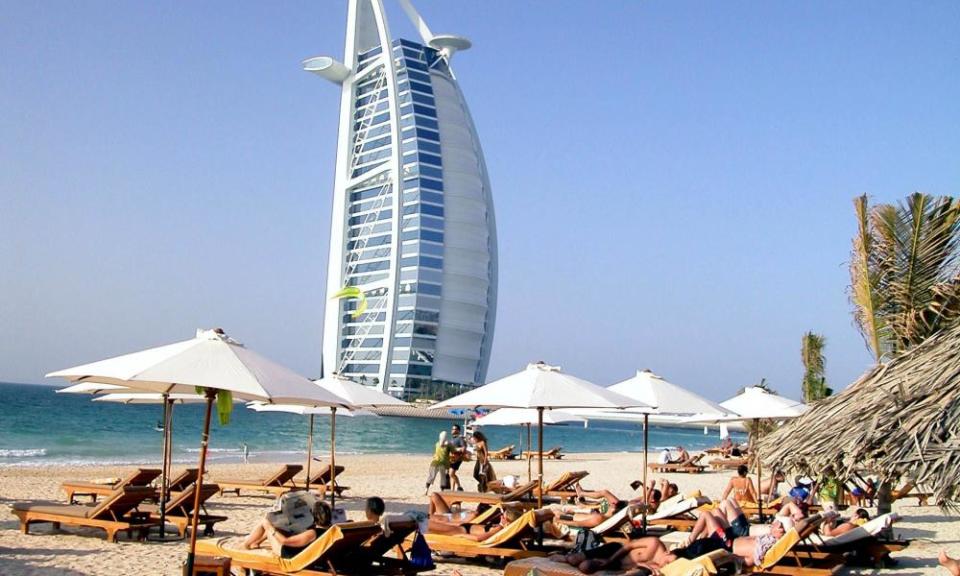Fraudsters ‘turning Dubai into the new Costa del Crime’

Fraudsters involved in scams costing the Treasury almost £100m have bought a string of luxury apartments in Dubai – now considered to have replaced Spain’s Costa Del Crime as the place to launder money – a major leak of a secret Dubai property database has revealed.
The list of purchasers will be studied closely by British investigators, who have been chasing the missing millions the fraudsters owe the UK and other European countries. All the men are accused of being involved in so-called carousel fraud, which is estimated to have cost the UK £16.5bn in tax revenues between 2005 and 2016.
Rod Stone, former assistant director of the HM Revenue and Customs organised crime national coordination unit, said fraudsters began consigning goods via Dubai in 2005 in an attempt to undermine the tax authorities’ ability to identify the tell-tale circular movements that indicate carousel fraud. “Fraudsters used Dubai banks to avoid both the stringent anti-money laundering reporting requirements in the UK, and the authorities’ ability to freeze their ill-gotten gains,” Stone said. “Many law enforcement professionals now believe that Dubai has replaced the Costa del Crime in Spain as the place criminals conceal and invest the proceeds.”
The Organised Crime and Corruption Reporting Project, an international investigative organisation, obtained a huge leak of Dubai property ownership records dating from 2014 to 2016, which Finance Uncovered, another investigative journalism body, searched for businessmen of interest to UK authorities. One is London-educated Mustafa Al Hassani, whose mobile phone wholesale business, Abyss International, operated out of Dubai and London. The 47-year-old, who has a passion for expensive cars and whose company – part of a chain that owes huge sums to HMRC – is being wound up by court order, bought eight previously unknown Dubai properties worth more than £2.5m. It is unclear whether he still owns them. The properties identified are in the highly sought after Jumeirah Beach development overlooking the Gulf coast, and in the Greens and Views development backing onto the Emirates Golf Club.
Hassani’s younger brother, Haider, from whom HMRC has sought to secure millions of pounds in damages, also bought property in Dubai.
Finance Uncovered found that one alleged fraudster who was accused of using companies in the UK and the British Virgin Islands to defraud the Treasury owned or owns at least three properties in Dubai. Another, Mohsin Salya from Preston, was imprisoned in Germany for three years and three months for tax evasion linked to the EU carbon market. The indictment from 2016 stated that Salya had been part of a carousel fraud “gang” that had attempted to defraud the German authorities of €125 in fraudulent tax reclaims via a Dubai companym.
According to the leaked data, Salya is or was the owner of three apartments in the “family oriented” Discovery Gardens development in Dubai. Salya, who is now out of jail and living in the emirate, said the properties were bought long before his involvement in the fraud that led to his jail term. According to their father, the Hassani brothers are living in Dubai and Iraq. He told the Observer: “It was a long time ago.”
In carousel fraud, a UK business imports high value goods VAT-free and sells them to a UK company with VAT added. The import company collects the VAT but does not pay it to HMRC. The goods are re-sold several times through a chain of “buffer” companies. In the final transaction, a company reclaims VAT from HMRC while the first and last companies in the chain disappear, having fraudulently claimed VAT that was never paid.
Other fraudsters with Dubai properties exploited “carbon credits” generated by the EU Emissions Trading Scheme. Europol has estimated that carousel scam in carbon credits cost around €5bn between 2008 and 2009.

 Yahoo News
Yahoo News 